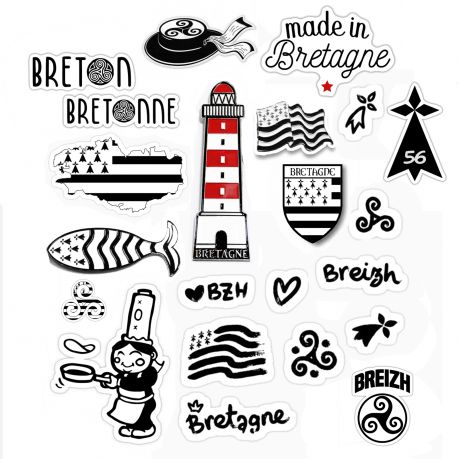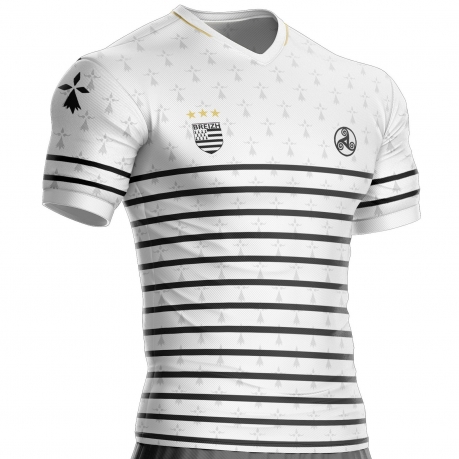The history of Breton football: A rich and passionate tradition

In Brittany, football is not just a sport, it is a true religion. From wind-swept shores to green valleys, football punctuates the lives of residents, young and old. This passion is passed down from generation to generation, creating a mosaic of unique stories and traditions.
The history of Breton football is rich and passionate. It dates back to the very origins of this sport, when English sailors landed on the Breton coast with their balloons. From there, a flame was born that has never been extinguished.
Over the years, Breton football has developed and given birth to major clubs, such as Stade Rennais and FC Nantes. These clubs have marked the history of French football by winning numerous titles and participating in European competitions.
Breton football is much more than just a sport. It is an essential element of the cultural heritage of the region. It is a source of pride and unity for the Bretons, who gather in the stadiums to vibrate to the rhythm of the matches.
I. At the origins of Breton football
The first steps of football
Breton football did not emerge from nothing. Its history begins in the 19th century, when English sailors, accompanied by their leather balloons, landed on the Breton coast. Intrigued by this fascinating object, the Bretons quickly adopted this new game, infusing it with unique fervor and creativity.
Birth of pioneer clubs
From the 1880s, the first Breton clubs were created. Among the pioneers were Stade Rennais (1901), FC Nantes (1901) and En Avant Guingamp (1902). These clubs, founded by enthusiasts, quickly became the spearheads of Breton football, spreading the passion for football throughout the region.
The rise of amateur football
Amateur football played a crucial role in the development of Breton football. Local and regional competitions were set up, allowing clubs to measure themselves and perfect their talents. The enthusiasm was such that entire villages mobilized to support their teams, creating a unique and friendly atmosphere.
Notable figures
Many talented players left their mark on the history of Breton football at this time. Among the emblematic figures, let us cite Jean Prouff, legendary figure at Stade Rennais, and Henri Guérin, French international and native of Lorient. Their exploits contributed to the popularity of football in Brittany and inspired future generations.
II. The golden age of Breton football
The emergence of big clubs
The beginning of the 20th century marked the golden age of Breton football. Clubs such as Stade Rennais and FC Nantes rose to the top of French football, rivaling the biggest teams in the country.
Stade Rennais, a dominant force
Stade Rennais established itself as one of the leading clubs of the time. Nicknamed "the Reds and Blacks", the Rennais won three French championship titles (1931, 1932 and 1935) and reached the final of the Coupe de France in 1937. Talented players, such as Jean Prouff and François Pinault, contributed to the reputation of the club.
FC Nantes, a flamboyant success
FC Nantes was quick to follow in the wake of Stade Rennais. In 1965, the "Canaris" won their first French championship title, becoming the first team outside of Paris, Marseille and Saint-Étienne to achieve this feat. Under the leadership of José Arribas, the Nantes club enjoyed a prosperous period, winning eight French championship titles and the Coupe de France in 1979. Talented players, such as Henri Michel, Bernard Blanchet and Didier Deschamps, made history of the club.
Rivalry and passion
The confrontations between the Breton clubs and the French clubs were always marked by great intensity. The rivalry with Paris Saint-Germain, Olympique de Marseille and Olympique Lyonnais was particularly fierce. These matches were moments of communion for the Breton supporters, who vibrated to the rhythm of the exploits of their teams.
A precious heritage
The golden age of Breton football has left a precious legacy. Breton clubs continue to maintain a tradition of flamboyant play and boundless passion. Talented Breton players, such as Yoann Gourcuff and Kylian Mbappé, promote Breton football internationally.
III. Breton football today
The era of professional football
Breton football underwent a profound transformation with the advent of professionalism in the 1930s. This evolution allowed Breton clubs to structure themselves and develop, attracting talented players and investing in youth training.
Challenges to overcome
Despite its past successes, Breton football is today faced with many challenges. Breton clubs struggle to compete financially with the richest French clubs. The competition to attract the best players is also very tough.
A promising future
Despite these difficulties, the future of Breton football is far from gloomy. Breton clubs are striving to modernize and develop quality infrastructure. Training young people is also a priority, with high-performance training centers attracting talent from across the region.
The hope of a renewal
The emergence of talented young players, such as Mathys Tel and Eduardo Camavinga, allows us to look to the future with optimism. The passion for football in Brittany is still as strong as ever and supporters continue to support their teams with fervor.
A future to build
The future of Breton football is being built today. By relying on its traditions and its passion, by investing in the training of young people and by modernizing, Breton football can regain its former glory and write new glorious pages in its history.
The flame of Breton football
Football is much more than just a sport in Brittany. It is a true passion that is passed down from generation to generation. It is an essential part of the region's cultural heritage, a source of pride and unity for its inhabitants.
A legacy to preserve
Breton football has a rich and unique history. It is important to preserve this heritage by continuing to keep the passion for football alive in the region. This involves supporting Breton clubs, transmitting the values of sport to younger generations and promoting the history of Breton football.
A future full of hope
The future of Breton football is promising. The passion is still there, young talents are emerging and the clubs are striving to modernize. By building on its strengths and meeting its challenges, Breton football can regain its former glory and write new glorious pages in its history.
Breton football is a flame that burns with passion in Brittany. It is a precious heritage to preserve and a promising future to build.
The origins of Breton football
1. The first steps of football (1870-1900)
Early 1870s: Introduction of football to Brittany by English sailors.
1872: First football match organized in Saint-Brieuc.
1883: Foundation of the first Breton club, Stade Rennais.
1890: Creation of the Ligue de Bretagne de Football Association.
1897: Organization of the first Brittany championship.
2. Birth of pioneer clubs (1900-1914)
1901: Foundation of FC Nantes and En Avant Guingamp.
1902: Foundation of Stade Brestois 29.
1904: Foundation of Lorient Sports.
1910: Stade Rennais wins its first title of champion of Brittany.
3. The rise of amateur football (1914-1932)
Development of local and regional competitions.
Creation of the Coupe de Bretagne in 1922.
Construction of stadiums and sports infrastructures.
Increase in the number of licensees and clubs.
Notable figures
Jean Prouff (Stade Rennais)
Henri Guérin (FC Lorient)
François Pinault (Stade Rennais)
The golden age of Breton football
1. The emergence of the big clubs (1932-1970)
Stade Rennais is establishing itself as a dominant force in French football.
FC Nantes is becoming a major club on the national and international scene.
En Avant Guingamp and Stade Brestois 29 reach Division 1.
2. A rich and flamboyant track record
Rennais Stadium:
3 French championship titles (1931, 1932, 1935)
1 Coupe de France (1965)
1 Coupe de France final (1937)
FC Nantes:
8 French championship titles (1965, 1966, 1973, 1977, 1980, 1983, 1995, 2001)
3 French Cups (1979, 1999, 2000)
Champions League semi-finalist (1996)
3. Intense and passionate rivalries
Electric confrontations with Paris Saint-Germain, Olympique de Marseille and Olympique Lyonnais.
High-stakes matches and an electric atmosphere in Breton stadiums.
Pride and passion of Breton supporters during Breton derbies.
Key moments
1932: Stade Rennais wins its first French championship title.
1965: FC Nantes wins its first French championship title.
1979: FC Nantes wins its first Coupe de France.
1996: FC Nantes reaches the semi-finals of the Champions League.
III. Breton football today
1. The era of professional football (since 1932)
Structuring of Breton clubs with professional and youth teams.
Development of training centers to attract and train talents.
Increased budgets thanks to TV rights, sponsors and merchandising.
2. Challenges to overcome
Difficulty competing financially with the richest French clubs.
Increased competition to attract the best players.
Infrastructure sometimes aging and in need of modernization.
3. A promising future
Investment in training young people to develop local talent.
Modernization of infrastructure and development of stadiums.
Ambition to regain its former glory and compete at the national level.
Projects and ambitions
Develop partnerships with local businesses.
Increase the visibility of Breton football internationally.
Attract talented players and retain them.
Train quality coaches and educators.
The flame of Breton football
Football is much more than just a sport in Brittany. It is a true passion that is passed down from generation to generation. It is an essential part of the region's cultural heritage, a source of pride and unity for its inhabitants.
Passionate fans and a vibrant culture
Breton supporters are known for their fervor and their attachment to their clubs. They sing, shout and encourage their teams with unparalleled fervor. This passion is contagious and helps to create a unique atmosphere in Breton stadiums.
A heritage to preserve
Breton football has a rich and unique history. It is important to preserve this heritage by continuing to keep the passion for football alive in the region. This involves supporting Breton clubs, transmitting the values of sport to younger generations and promoting the history of Breton football.
A future full of hope
The future of Breton football is promising. The passion is still there, young talents are emerging and the clubs are striving to modernize. By building on its strengths and meeting its challenges, Breton football can regain its former glory and write new glorious pages in its history.
Breton football is a flame that burns with passion in Brittany. It is a precious heritage to preserve and a promising future to build.







